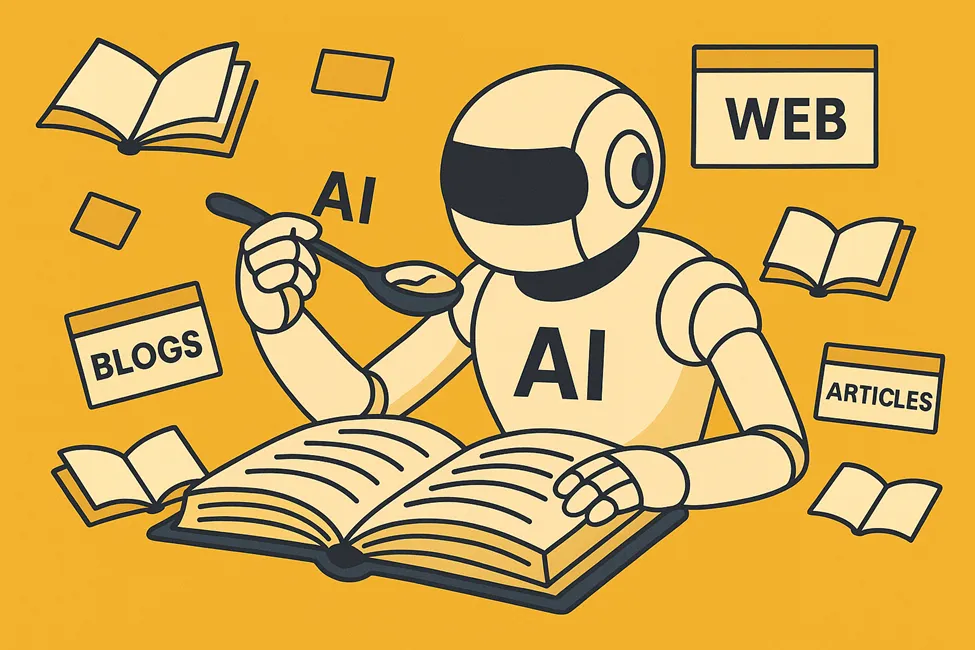And why the future depends on rewarding original sources

AI is fundamentally changing how users discover and consume web content
For decades, the internet's content economy was built on a simple exchange:
- Creators publish answers to billions of what, why, where, when, who, which, how questions.
- Search engines index those answers, show snippets, and send traffic to the source.
- That traffic turns into ad revenue, affiliate sales, or leads — funding the next wave of content.
It wasn't flawless, but it was sustainable.
Now, AI is rewriting the rules — and breaking that exchange.
When a user used to type:
"How to run Facebook Ads"
They would:
- See multiple blue links on Google.
- Visit one or two sites.
- Interact with brands, download a guide, maybe hire a consultant.
Today, with ChatGPT, Claude, Perplexity, or Gemini, they:
- Ask the same question directly to AI.
- Get a complete, conversational answer instantly.
- Never see your blog, never click your link, never enter your funnel.
The top of the funnel — once the oxygen for blogs — is being eaten alive.
Early on, AI couldn't give live data or location-specific answers. But with live search integrations:
- "What's the weather in Gurgaon today?" → AI fetches from a live API.
- "Best Italian restaurant near me open now" → AI pulls from maps and reviews.
- "Show me the latest gold price in Delhi" → AI taps finance feeds.
The so-called "safe zones" for traffic are shrinking fast.
Even with live search, there are cracks AI hasn't filled — yet:
- Proprietary Data — Campaign results, internal research, private analytics.
- Closed Community Knowledge — Content inside private forums, masterminds, member areas.
- First-Person Credibility — The lived experience of a local realtor, a café owner, or a marketer who ran 200 ad tests.
- Interactive Brand Experiences — Free trials, calculators, custom templates, immersive demos.
These aren't "just information" — they're experiences and insights AI can't generate from thin air.
Here's the paradox:
- AI's answers are trained on millions of pages of human-created content.
- It uses those answers to keep users inside the AI interface.
- Creators get no link, no credit, no traffic — but are expected to keep creating.
No incentive → less new content → lower-quality AI answers → degraded user trust.
It's a slow starvation of the very ecosystem AI depends on.
If AI wants fresh, accurate, trustworthy answers tomorrow, it can't just consume — it has to feed the system:
- Credits and Links — Show sources alongside answers, like Perplexity does.
- Traffic Sharing — Send users to the original site when they want depth or proof.
- Revenue Sharing — Adopt a publisher partnership model similar to YouTube or news licensing.
Without this, the web risks becoming an echo chamber of outdated, recycled knowledge.
Until that shift happens, you can still position yourself in the funnel:
- Be the "Second Stop" Content — The piece they find after realizing AI's answer wasn't enough.
- Offer Proprietary Tools & Templates — Something they can download or interact with.
- Capture Direct Audiences — Email lists, podcasts, private groups — immune to AI scraping.
- Publish Opinionated, Experience-Driven Content — The "why it worked for me" that AI can't fake.
💡 Bottom line:
AI will keep taking over question-based searches. Live-search integrations will make it even more dominant.
But if it doesn't start rewarding the sites it learns from, the well will dry up — and the AI that killed the link click will have nothing left to drink from.
Get in touch with Qaushik Labs — Digital Marketing Agency in Gurgaon for your marketing needs!
AI is breaking the traditional exchange where creators publish content, search engines send traffic, and that traffic generates revenue. Now users get answers directly from AI without visiting the original sources, eliminating the traffic that funded content creation.
Content that AI can't fully replace includes proprietary data and research, closed community knowledge, first-person credibility and lived experiences, and interactive brand experiences like free trials and custom tools.
AI depends on fresh, accurate content from human creators. If creators stop producing quality content due to lack of incentives, AI answer quality will degrade, leading to reduced user trust. AI platforms will need to implement credits, traffic sharing, or revenue sharing to maintain their content ecosystem.
Website owners should focus on becoming the "second stop" after AI answers, offering proprietary tools and templates, building direct audiences through email and communities, and publishing experience-driven content that AI cannot replicate.
The paradox is that AI trains on human-created content but keeps users within AI interfaces, giving creators no traffic or revenue while expecting them to keep creating. This creates a cycle: no incentive leads to less content, which leads to lower AI quality, which degrades user trust.